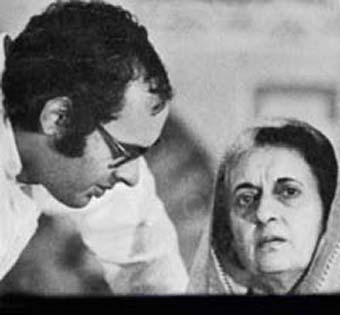
Elections for the Parliament and state governments were postponed. Invoking article 352 of the Indian Constitution, Indira granted herself extraordinary powers and launched a massive crackdown on civil liberties and political opposition. The Government cited threats to national security, as a recent war with Pakistan had just been concluded. It claimed that the strikes and protests had paralysed the government and hurt the economy of the country greatly. Indira herself had the right to appeal to the Supreme Court of India and had no legal obligation to resign until then. In face of massive political opposition, desertion and disorder across the country and the party, Indira stuck to the advice of a few close party loyalists and her younger son Sanjay Gandhi, who had become a close political advisor.
The Government used police forces across the country to arrest thousands ofprotestors and strike leaders. J.P. Narayan, Morarji Desai, Charan Singh, Jivatram Kripalani, Atal Bihari Vajpayee,Lal Krishna Advani and other protest leaders were immediately arrested. Organizations like the Rashtriya Swayamsevak Sangh and opposition political parties were banned. Innumerable number of Communist leaders and masses were arrested.
Indira attempted to re-write the nation's laws with the help of the Parliament, where the Congress controlled over a two-thirds majority. She convinced the President to issue "extraordinary laws" that by-passed parliament altogether, allowing her to rule by decree. She constructed a 20-point economic program to increase agricultural and industrial production, improve public services andfight poverty and illiteracy. She had little trouble in getting amendments to the constitution passed that exonerated her from any culpability in herelection fraud case, declaring President's Rule in Gujarat and Tamil Nadu where anti-Indira parties ruled (state legislatures were thereby dissolved and suspended indefinitely), and jailing thousands of opponents. The Defence of India Act and the MISA were amended in July 1975.
The Reason Cited
Instead of apologizing for suspending political rights, Indira emphasized that some authoritarianism was needed to thwart "a deep-rooted conspiracy" that would have "led to economic chaos and collapse," making India "vulnerable to fissiparous tendencies and external danger."
Using the kind of argument that has always been favored by dictators seeking to justify their abrogation of political processes, Mrs. Gandhi declared: "In India, democracy has given too much freedom to people." Newspapers and opposition politicians, she added, "were trying to misuse [democracy] and weaken the nation's conscience."
